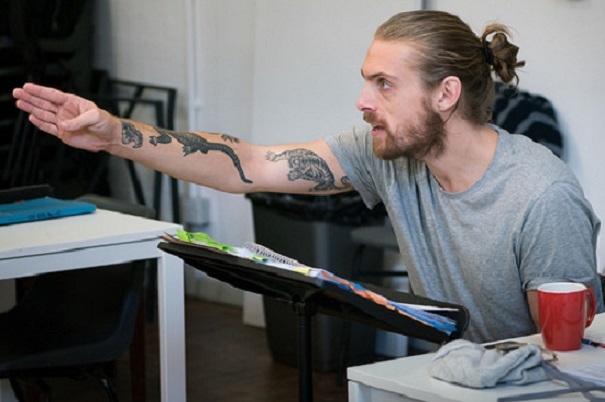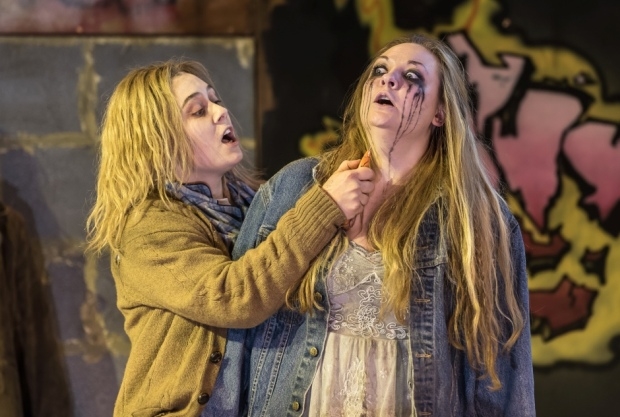Gerard Jones, opera director: 'Not angry, just gagging'

His twitches aren’t nerves and the fierceness in his eyes isn't fury. Both, rather, are a conduit for Gerard Jones's unstoppable passion. The edgy opera director has just emerged from two years on the Royal Opera’s young artists programme and he is demob wired. We met at Wilton's Music Hall where Jones's production of La Tragédie de Carmen, Peter Brook’s chamber-scale reinvention of Bizet’s opera, is up and running. When it's over he’ll be off, free from the shackles of a large organisation.
"You’re there in that building every day, and that was a big change of lifestyle for me because I’d been working as an assistant director for six or seven years, in particular with Richard Jones. I’d been to New York with him, and Milan, Hamburg, so being a Jette Parker Young Artist was a conscious acceptance that I’d be taking a different turn.
"They were quite tough. They remould your ego and your expectations of how difficult a career can be. It was very good, very realistic. But you also get deep down into the rabbit hole of the Royal Opera House. A lot of people work there full-time and it’s their universe, whereas as a freelance director the world is my oyster – or at least Germany is – and reconnecting to the outside has been very exciting."
So what happens next? "I’m off to Bilbao straight after this. Calixto Bieito runs that theatre; he saw a photo of a rehearsal of my Oreste last year and he gave me a job on the strength of it. I’ll be doing a 70-minute staging of Monteverdi's Madrigals, Books V and VI. We’re having a toddler and a coffin onstage so there’ll be nothing traditional about it."
The last thing I'd call him is a traditionalist. "Exactly. And being a non-traditionalist in Covent Garden isn’t a particularly comfortable role because you’re always on the outskirts of things. Your ideas are combed through months in advance for how an audience is going to respond to them. It’s been that way ever since William Tell [in Damiano Michieletto‘s controversial 2015 staging]. During the rehearsal period there’s a close eye because they don’t want another experience like that. It was a good show but they don’t want that bad publicity again.
"There was something similar when I worked on the Glyndebourne Rosenkavalier and all that bad attention went to the Irish mezzo Tara Erraught [who was characterised in some newspaper reviews as being physically unsuited to her role]. Tara was a joy to work with and was a really open, lovely human being, and I saw what happened to her and how shocked she was by it.

© Clive Barda
"Then a year ago, when I got home after the first night of Oreste [Jones's previous production at Wilton's, in 2016], I googled what was coming up and I immediately felt the intense hurt when people say nasty things about your work. But that’s what you get when you put your work out there. And people can and should express themselves, and that’s good. I hate easy middle-of-the-road things like Downton Abbey, and I’m not ashamed to be the person who reaches out to other people who feel the same way."
Since everything Gerard Jones does seems to be consciously radical, it's surprising to hear that he reacted so sensitively a year ago. "It was my first big show and I was a young director, so I wasn’t as good as I am now about releasing it into the world. With Oreste I was so tied up with what I was trying to do, and in a way I was aching for people to be angry about it because it was abrasive and uncompromising. The worst you could say about Oreste is that it was a bit too German for here, and you can’t predict what the audience reaction would be. All I’m interested in is the audience."
He’s now mentioned Germany a couple of times. Is that where he’s drawn to? "Yes, definitely. And it has much the greater number of theatres who are drawn to me, too, and are asking to meet me. My agent lives in Berlin so that’s working out very well. It’s the next place on the horizon.
"Over here everything needs to be representational on the stage." Meaning we’re too timid? "Yes, for sure. And we’ve got a lot more timid since I was a child. The first shows I saw at the ROH as a teenager were off the wall compared with what’s going on now. Richard Jones’s Götterdämmerung, Tim Albery’s Nabucco… These shows were wild and people either hated them or adored them. There wasn’t this warm bath of ambiguity around them.
"Today it’s a problem when it costs £260 to see a production that infuriates people, but I think there’s a middle ground. Covent Garden is flourishing financially, yet the coolest three directors from when I started going to the opera are still the coolest three directors around, and that shouldn’t be the case. It doesn’t apply in any other art form that someone who’s 65 is still a wild child. Where did the next generation go? They all went soft. There are some fantastic directors around who can produced fantastic shows but they’re not leading an avant-garde English school.
"I think there is a lot of dross on the stage, but that’s who I am. It’s a curse on me; I wish I could go and see anything and enjoy it. But I’m old-school too: I don’t want people coming off the stage into the auditorium and I hate video on stage. I’ve never once used projections. If you can’t make it with the art form itself then you don’t need to be saying it in the theatre."
He sounds angry. "I’m not angry, just… gagging. In Germany there’s much more interrogation of what we’re here for and what the characters are, whereas here it seems to have gone backwards so that, at its worst, opera is just something you do between intervals."
La Tragédie de Carmen concludes its run at Wilton's Music Hall this evening, 14 November.











